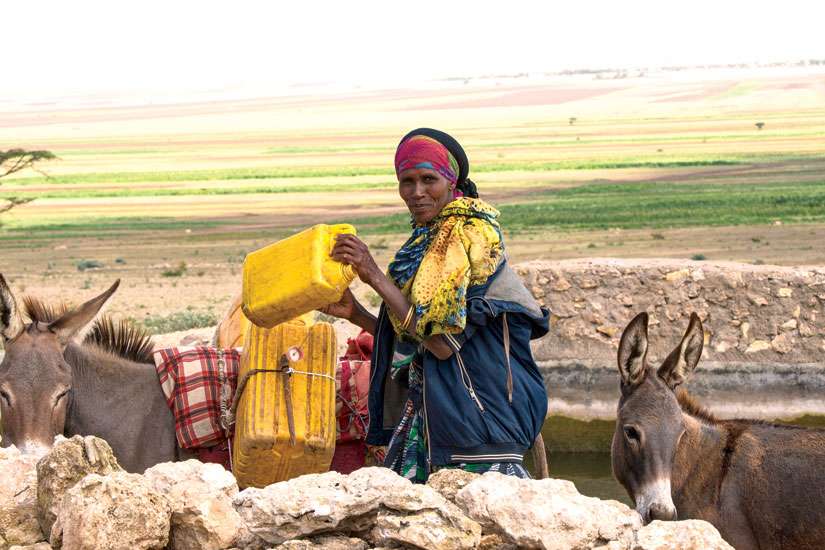The Catholic Near East Welfare Association has launched a cash appeal to help feed students at Catholic schools and youth in parish summer programs. The food aid will keep students in school and help secure their futures once the drought is over.
CNEWA has already sent $75,000 to fund a $250,000 initiative that feeds kids in parish programs through the summer holidays. The international association has so far provided another $100,000 of $400,000 needed to fund school breakfast and lunch programs in schools.
“Our priority is to ensure that kids won’t drop out of school, in particular girls,” said CNEWA Canada executive director Carl Hetu.
When families have trouble making ends meet, they frequently have to decide which of their children they can afford to send to school, given uniform, book and tuition costs. Most often it’s girls who lose out.
To combat that problem, schools provide pupils with enough food to get them through the day plus a little extra to take home to their families. In that way, parents are encouraged to send their daughters to school, where they are fed and then given food to bring home.
“The dropout rate is being kept to a minimum,” Hetu said.
The parish summer programs are an essential bridge to September’s restart of classes, said Hetu.
The school feeding programs have long been an area of focus for CNEWA’s aid to Ethiopia and in recent years the agency has built wells at eight different Catholic schools across the nation.
“We were well prepared. The system was in place,” Hetu said.
The school feeding programs benefit far more than the one per cent of Ethiopians who are Catholic. The Catholic schools welcome Muslim and Orthodox students.
Ethiopia’s two-year drought has highlighted a deepening divide between rich and poor, urban and rural in Africa’s fastest growing nation, a member of Ethiopia’s youthful, thriving Christian Life Community told The Catholic Register.
“I recently visited one of the drought-affected areas and tried to talk to some people,” said Gemechu Bekele in an e-mail from Ethiopia. “Many of them referred to it as extreme. But from what we hear in our cozy Addis Ababa it seems that the issue of drought is now in oblivion.”
Ethiopia’s gross domestic product has grown at a rate above 10 per cent a year over the last decade. The El Nino-driven drought has hardly put a dent in the massive building boom in and around the capital city. But in a country where more than 70 per cent of agriculture depends on rain because farmers have no irrigation systems, the picture is quite different.
“Money budgeted for development activities would be channeled into responding to this threat,” said Bekele.
“The Church is doing its best to help (farmers). But once the money is not there anymore I don’t know what will happen.”
Within the Jesuit-inspired Ignatian Christian Life Community, Bekele and his friends have been reading Pope Francis’ encyclical Laudato Si’. For Ethiopians, the Pope’s message on “Care for Our Common Home” is a wake-up call.
“Like in many other places, in Ethiopia the poor are more affected by climate change and injustice than the rich,” Bekele said. “This is a country where the gap between the poor and the rich alarmingly is widening.”
While privileged university students reading papal encyclicals may not directly help poor farmers who have watched their cattle die and their crops wither, it does reinforce that the suffering of the poor is not just their problem, Bekele said.
“Our Ignatian spirituality gives us a unique opportunity to look at it differently,” he said.
The CNEWA’s fundraising drive for Ethiopia has no target.
“We don’t want to limit ourselves with a particular number,” Hetu said. “If we have more, we’ll reach more people.”


